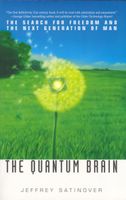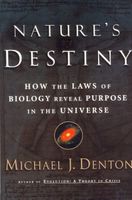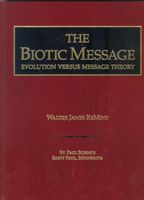Molecular biology is mankind’s attempt to figure out how God engineered his greatest invention—life. As with all great inventions, details are top secret; however, even top secrets may become known. I find it a great privilege to live in a time when God allows us to gain some insight into His construction plans, only a short step away from giving us the power to control life processes genetically.—Arnold Neumaier, Institut für Mathematik, Universität Wien
I hope it will be to the benefit of mankind, and not to its destruction.
(1996)
(The Quantum Brain
By Jeffrey Satinover :173)

Life, regeneration and the generation of the generations:
A self-replicating machine requires a data storage system which must be accessible or comprehensible to the constructor device. It requires that the constructor be assembled from a very small number of readily available substances. It requires a means of energy gener ation, storage, and distribution to its working components and so forth. None of these problems has been solved [mechanically]. Yet every second, countless trillions of living systems from bacterial cells to elephants replicate themselves on the surface of our planet.(Nature's Destiny: How the Laws of Biology
...it is not just the act of self-replication which has not been copied in our technology. Even the far less ambitious end of component self-assembly which is utilized by every living cell on earth, exhibited in processes as diverse as the assembly of viral capsules to the assembly of cell organelles such as the ribosome, a process whereby tens or hundreds of unique and complex elements combine together, directed entirely by their own intrinsic proper ties without any external intelligent guidance or control, is an achievement without any analogue in modern technology.
The well-known self-reorganizing, self-regenerating capacities of living things have been a source of wonderment since classical times—phenomena such as the growth of a complete tree from a small twig, the regeneration of the limb of a newt, the growth of a complete polyp, or a complex protozoan from tiny fragments of the intact animal. These are all phenomena without analogue in the realm of the mechanical. Imagine a space ship, a computer, or indeed any machine ever conceived, from the fantastic star ships of sci ence fiction to the equally fantastic speculations of nanotechnology, being chopped up randomly into small fragments. Imagine every one of the fragments so produced (no two fragments will ever be the same) assembling it self into a perfect but miniaturized copy of the machine from which it originated. Nature does this constantly. It is an achievement of transcending brilliance which goes beyond the wildest dreams of even the most ardent proponents of artificial life. I doubt there is anyone who has witnessed the regeneration of a protozoan through a microscope who has not been struck with an almost metaphysical awe at the wonder of the process.
Reveal Purpose in the Universe
By Michael Denton :147-148)

What do those who write the mythological narratives of Naturalism have to say about it?
...an asexual parent sends all its genes to each progeny. In the Darwinian struggle to pass on more of ones genes to future generations, asexuality is twice as efficient as sexuality. It is therefore difficult to explain how sexual reproduction might have become prevalent.
In addition, there are costs beyond the automatic genetic penalties of sex, and these non-genetic costs are large. There is the cost of evolving and maintaining the sex organs. There is the cost of various kinds of incompatibility, such as blood Rkt factor incompatibilities between mother and child. In a sexual organism there are problems of tissue rejection between mother and child. Also, in a male body its own sperm is like foreign tissue, due to its different genetic makeup. Special mechanisms are required to keep the body’s immune defenses from destroying its own sperm. This is also true for females and their eggs. All these problems are avoided in asexual organisms.
In finding a mate, courting, and copulating, a sexual organism will face risks that further place it at a disadvantage relative to an asexual peer. Loud mating calls, scents, extravagant plumage, exotic behavior, flowers and nectar all have their price. They use energy, alert predators, and frequently reduce the non- sexual functioning of the organism.
Evolutionary literature abounds with scenarios explaining how a minuscule increase in a certain trait allows a species to more optimally mate. Theorists are then satisfied they have explained the trait. For example, they offer scenarios to explain the evolution of optimal courting behaviors and even optimal copulation intervals and durations. They deliver intricate explanations of how a male can most optimally insure that his sperm is the one to fertilize a female. They give countless such scenarios, and they are quite serious about it. They seriously believe these have sufficient power to explain the evolution of optimal mating, courting, and copulation.
Yet the power of these scenarios is dwarfed by asexuality, which solves all these problems completely — in one swoop — and in the most optimal possible way. For an asexual organism these problems completely disappear. Asexual reproduction is easily the more efficient solution. Altogether these factors account for a large disadvantage to sex beyond the 50% cost of meiosis. Nonetheless, the literature focuses on the 50% figure as the major cause for concern. Again we must ask, Why is sex so extremely prevalent? Why is it here at all?
[...]
...in an asexual organism, gene combinations are inherited together and are not split apart. Therefore, a favorable gene combination would exert its influence in every descendant, rapidly propelling it to predominance in the population.
...results showed that in most plausible situations, sex is expected to hold back evolution, not accelerate it.[It] has proven difficult to produce explicit models that show that mixis [the genetic mixing caused by sexual reproduction] accelerates adaptive evolution. (Michod and Levin, 1988, p 2)This realization provoked a boldfaced, 180-degree turn-around in the explanation of sex. Now, it was claimed, sex is an advantage not because it hastens evolution, but because it slows evolution. Evolutionary experts have seriously made such claims. This situation was observed and lamented by Bell.To save the situation, then, we must perform a complete volte-face: just as it was self-evident to Weismann, Fisher and Muller that a faster rate of evolution would benefit a population, so we must now contrive to believe in the self-evident desirability of evolving slowly. (Bell, 1982, p 100)[...] Evolutionary theory is so plastic it can accommodate virtually anything. Nothing demonstrates that flexible story-telling like the evolutionists’ attempts to explain sex.
(The Biotic Message
By Walter ReMine :197, 203-204)
It is rather amusing how stumped the writers of the mythological narratives of Naturalism are on sex. It seems quite appropriate. I am a helpful fellow, so I'll try.
Once upon a time there was an ape-man and he had a rather random sort of random mutation. He felt, "What is this thing, and what is it for?" (Okay...this one can't go anywhere but down. I guess you'll have to think of your own mythological narrative of Naturalism. If you come to believe what you think up, then perhaps we can look into how silly you are for doing so.)
No comments:
Post a Comment